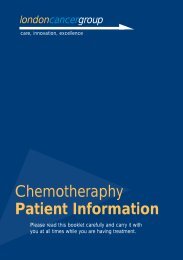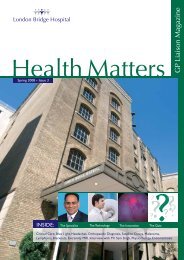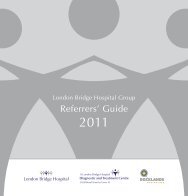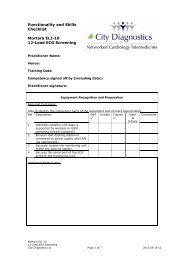Health Matters - London Bridge Hospital
Health Matters - London Bridge Hospital
Health Matters - London Bridge Hospital
- No tags were found...
You also want an ePaper? Increase the reach of your titles
YUMPU automatically turns print PDFs into web optimized ePapers that Google loves.
New TreatmentsLead to major changes in managementof Rheumatoid ArthritisRheumatoid Arthritis (RA) is the most common inflammatoryarthritis and causes severe damage to joints. RA also causesoverwhelming fatigue, early coronary artery disease and ashortened lifespan. However, new approaches to treatmenthave increased the chances of success.Dr Christopher Edwards, Consultant Rheumatologistand Honorary Senior Lecturer Southampton University<strong>Hospital</strong>s and The <strong>London</strong> Lupus Centre.ArthritisFeatures of poor prognosis Rheumatoid Arthritis• High titre RF• Anti-CCP antibodies• High ESR and CRP• Multiple joints involved• Female sexRheumatoid Arthritis causes damage in manydifferent waysRA damages joints due to inflammation in the joint lining(synovial membrane). The process is controlled by a varietyof protein messengers sent between cells called cytokines. Themost important of these is thought to be Tumour NecrosisFactor (TNF). The effect of activated immune cells releasinginflammatory cytokines leads to joint damage and disability.Chronic inflammation can also have negative effects in manyother areas of the body. Individuals with RA may have a shortenedlifespan by up to 20 years. Premature death is often due to earlyischaemic heart disease. Constant inflammation also causesdecreased bone mineral density, increasing the likelihood ofosteoporosis, and produces overwhelming fatigue.Early diagnosisRecent research has shown that better outcomes are achievedwhen RA is diagnosed and treated as early as possible. Therealso appears to be an opportunity in early disease, to divertRA to a more benign course, if treatment can be started soonenough. Individuals of any age with joint pain associated withearly morning joint stiffness lasting more than 30 minutesshould be considered for assessment.Predicting severity; matching treatment to individualpatientsThe best possible treatment of RA requires an attempt to bemade at predicting the likely prognosis of each patient. A numberof features are associated with a poor prognosis in RA. Theseinclude female sex, younger age, multiple joint involvement,presence of RF and anti-CCP antibodies, high ESR and CRP.The best use of traditional DMARDsThere have been major changes in how traditional DMARDs(Disease Modifying Anti-Rheumatic Drugs) are used. Methotrexateis now the treatment of first choice for most patients and isgenerally well tolerated in doses of 7.5-25mg per week. ForDeformity can occur early if RA is untreatedresistant disease, methotrexate may be used in combination withother DMARDs. Intensive monitoring, using validated scoring systemsand frequent review, improves outcomes.Biological therapiesThere are currently three TNF inhibitors available to treat individualswith RA. Infliximab, Etanercept and Adalimumab are all effective attreating the inflammation and joint damage associated with severeRA. Severe RA may also be treated with the anti-B cell therapy,Rituximab or T cell co-stimulation inhibitor, Abatacept. A numberof new agents are in development including, other TNF inhibitors,an IL-6 inhibitor and new B cell inhibitors.ConclusionRA damages joints and, because it has widespread effects on manyother organs, can lead to a shortened lifespan. The best treatmentrequires early diagnosis and assessment of prognosis. TraditionalDMARDs, such as methotrexate, should be instituted early andcorticosteriods can be used until they become effective. Combinationsof DMARDs may be effective if monotherapy fails. Knowing whento increase or change therapy requires careful monitoring for sideeffectsand a regular record of a disease activity. When DMARDsare not effective, new biological therapies can be used.Key messages• Assess prognostic markers• Early therapy with DMARDs• Methotrexate• Consider collateral damage• Monitor disease activity score closely• Consider biological therapiesFor more information on the treatment of Rheumatoid Arthritis please contact Dr Christopher Edwards.Address: The <strong>London</strong> Lupus Centre, 1st Floor, St Olaf House, <strong>London</strong> <strong>Bridge</strong> <strong>Hospital</strong>, 27 Tooley Street, <strong>London</strong> SE1 2PRTel: 020 7234 21557
















